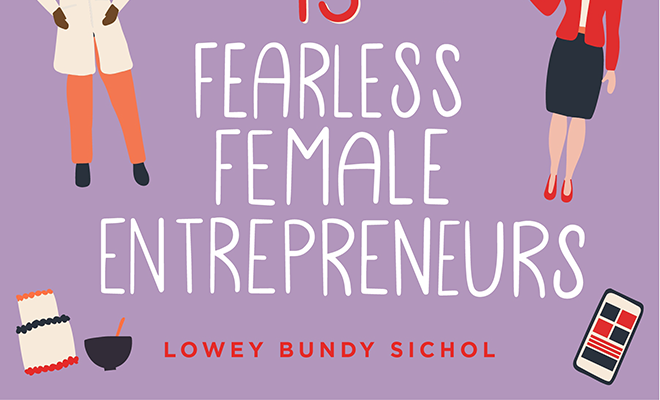
Idea Makers: 15 Fearless Female Entrepreneurs by Lowey Bundy Sichol
You’re a problem-solver. You see something that you can make better and so you do. You’ve never met something that can’t be improved, fixed or altered in some way, and the solutions always come easy. It’s a gift, one that you’re happy to share with people, so why not take a page from Idea Makers by Lowey Bundy Sichol and make it a career?
“I coulda thought of that!” You’ve probably said that a lot, especially after you’ve seen something that’s making somebody a lot of money. You could have created that. You could be rich like Mark Zuckerberg or Elon Musk. But what about female entrepreneurs? Says Sichol, about 40 percent of the businesses in the U.S. are run by women, generating nearly $2 trillion a year. Their stories are just as exceptional – and just as inspirational.
To be an entrepreneur, Sichol says, solve a problem. Heidi Zak realized how inconvenient it was to buy a bra in person, so she founded ThirdLove. Jenn Hyman understood that designer clothing was expensive, and she sketched out Rent the Runway. If there’s something for which you have a passion, then look at the story of Alli Webb, who knew that women wanted fun, fuss-free beauty and so she founded the Dry Bar. Lisa Price followed her nose, quite literally, into Carol’s Daughter, an empire that offers wonderfully-scented beauty products specifically for African American skin. Jasmine Crowe knew the stats: millions of people go hungry every day in this country, and her Goodr helps fix that problem.
Finally, pay attention. Good ideas often come naturally when you work hard and keep your eyes open. It happened to Tate’s Bake Shop’s Kathleen King and Spanx’s Sara Blakely, and it could happen to you.
As you’re paging through Idea Makers and feeling quite inspired, one thing might eventually strike you: the women inside these pages are not necessarily household names. Some, in fact, may be totally unfamiliar to you which, in a way, makes its own point: fame isn’t a requirement for entrepreneurship. In her introduction and repeatedly through the profiles she shares, author Sichol also shows that gender has nothing to do with success, either, nor does speed. The stories of the women inside this book subtly show perseverance and dedication, two traits that are often ignored in many be-an-entrepreneur books. That honesty may, for readers who dream of being their own boss someday, be the best part of what you’ll read.
The First, The Few, The Only: How Women of Color Can Redefine Power in Corporate America by Deepa Purushothaman
There’s no one like you. For most of your life, you’ve been told how unique you are, how wonderful, how important, all true. You’re one of a kind, singular, you’re like no one else on Earth. And in The First, The Few, The Only by Deepa Purushothaman, that probably goes at work, too.
Most workplaces were made for men. If you’re a woman, you already know this. It’s evident in the height of the counters and the temperature of the rooms. But for Women of Color, or WOC, that statement is keener, especially if you’re the first, one of a few, or the only WOC there now. With no other WOC to bounce ideas with, how do you survive and thrive at work?
Says Purushothaman, there are three main ways. First, Find Your Power. Eliminate delusions that you or your bosses may hold, and hear the messages you’re getting. They can see you, when it comes to hiring. You can fit in without losing a part of yourself. Closely notice the lessons you’ve learned from your family and your culture, and be sure that you’re sending the right lessons to the next generation.
Take care of yourself When Your Mind and Body Speak. Look for your own joy, know the detrimental effects of racism and ignore the urge to work harder just because of your skin color. Know what to do about those microaggressions you seem to hear constantly.
Finally, seize The Power of We. Find your community in the corporate world at large. Be open to learning and changing the game from within. Know what six things to ask yourself if you’re thinking about a new job. And never forget who you are.
The First, The Few, The Only can be a place for confirmation, if you’re a WOC; Purushothaman speaks directly to your experiences and she offers sympathy and camaraderie. There’s advice here that you can use, including tips for those hours when you aren’t working. You can also consider this a primer if you’re not a woman and/or not of color. Supervisors, CEOs and business owners who want to do better have a place to start here, with a dive into things you don’t know, things you shouldn’t do and irritations your new employee probably won’t tell you.







